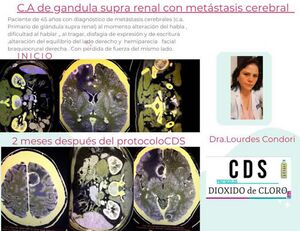Suprarenal cancer with brain metastasis
Dra. Lourdes Condori
Suprarenal cancer with brain metastasis

Suprarenal cancer with brain metastasis is a serious and complex condition that significantly impacts a patient's quality of life. In this case, we have a 45-year-old patient who has been diagnosed with suprarenal cancer, which has unfortunately progressed to include metastasis to the brain. This progression has led to several concerning symptoms that greatly affect the patient's daily functioning.
The patient exhibits altered speech, which indicates difficulties in verbal communication. This can manifest as trouble forming words or sentences, leading to frustration and challenges in interacting with others. Additionally, the patient experiences significant difficulty in swallowing, known as dysphagia, which poses risks for adequate nutrition and hydration.
There are also notable changes in the patient's ability to express themselves and write, further complicating their communication efforts. The altered equilibrium on the right side of the body suggests that the patient's balance has been compromised, making it dangerous for them to move independently. Furthermore, the presence of hemiparesis on the right side of the face and in the arm and leg (braquiocrural) indicates weakness in those areas, which can severely limit mobility and independence.
The loss of strength on the same side accentuates these challenges, making it even more difficult for the patient to perform everyday tasks and engage in their usual activities. Overall, the combination of these symptoms not only highlights the physical toll of the disease but also underscores the emotional and psychological impact on both the patient and their loved ones as they navigate this difficult journey.
